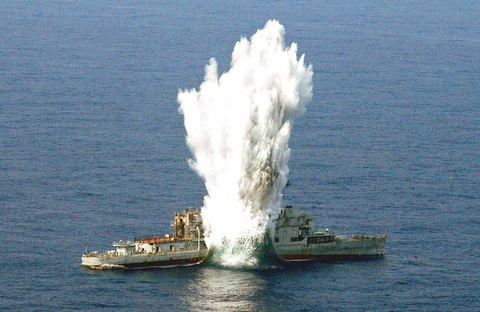After a 12-minute journey, a torpedo launched from a Jianlong-class submarine hit its target ship yesterday, and officials at the Kaohsiung naval base hailed the drill as a success.
"The live drill proved that submarines are an effective and useful force, and the navy hopes that it can quickly establish an advanced submarine force," naval chief of operations Chen Pan-chih (陳邦治) said yesterday.
The drill was conducted in waters off Hsiao Liuchiu (小琉球), an island off the southwest coast. The Jianlong-class submarine launched the torpedo at 9am and hit the target in a violent plume of water. Chen and the other officials cheered as the torpedo hit the target.

PHOTO: AP
A half hour later, the smoking ship slowly sank.
The Navy broadcast the drill live at the Kaohsiung base. Chen admitted that he and naval officials were under pressure because variables in the sea environment might have affected the torpedo's path.
The navy has fired submarine-launched torpedoes five times in the last two years. Three of them hit the targets.
Chen said yesterday's drill used a large, wire-guided torpedo costing NT$100 million (US$3.2 million).
He then called for the formation of an advanced submarine force to deter China from engaging in a war.
Chen said that if China's submarines blockaded Taiwan's harbors and sea lanes, Taiwanese submarines would be able to counter-blockade in kind along the coast and in major harbors.
He said the currently stalled arms-procurement bill would, if passed, greatly increase the cost and risks for China if it attempted to start a war with Taiwan.

AGING: As of last month, people aged 65 or older accounted for 20.06 percent of the total population and the number of couples who got married fell by 18,685 from 2024 Taiwan has surpassed South Korea as the country least willing to have children, with an annual crude birthrate of 4.62 per 1,000 people, Ministry of the Interior data showed yesterday. The nation was previously ranked the second-lowest country in terms of total fertility rate, or the average number of children a woman has in her lifetime. However, South Korea’s fertility rate began to recover from 2023, with total fertility rate rising from 0.72 and estimated to reach 0.82 to 0.85 by last year, and the crude birthrate projected at 6.7 per 1,000 people. Japan’s crude birthrate was projected to fall below six,

US President Donald Trump in an interview with the New York Times published on Thursday said that “it’s up to” Chinese President Xi Jinping (習近平) what China does on Taiwan, but that he would be “very unhappy” with a change in the “status quo.” “He [Xi] considers it to be a part of China, and that’s up to him what he’s going to be doing, but I’ve expressed to him that I would be very unhappy if he did that, and I don’t think he’ll do that. I hope he doesn’t do that,” Trump said. Trump made the comments in the context

SELF-DEFENSE: Tokyo has accelerated its spending goal and its defense minister said the nation needs to discuss whether it should develop nuclear-powered submarines China is ramping up objections to what it sees as Japan’s desire to acquire nuclear weapons, despite Tokyo’s longstanding renunciation of such arms, deepening another fissure in the two neighbors’ increasingly tense ties. In what appears to be a concerted effort, China’s foreign and defense ministries issued statements on Thursday condemning alleged remilitarism efforts by Tokyo. The remarks came as two of the country’s top think tanks jointly issued a 29-page report framing actions by “right-wing forces” in Japan as posing a “serious threat” to world peace. While that report did not define “right-wing forces,” the Chinese Ministry of Foreign Affairs was

PREPAREDNESS: Given the difficulty of importing ammunition during wartime, the Ministry of National Defense said it would prioritize ‘coproduction’ partnerships A newly formed unit of the Marine Corps tasked with land-based security operations has recently replaced its aging, domestically produced rifles with more advanced, US-made M4A1 rifles, a source said yesterday. The unnamed source familiar with the matter said the First Security Battalion of the Marine Corps’ Air Defense and Base Guard Group has replaced its older T65K2 rifles, which have been in service since the late 1980s, with the newly received M4A1s. The source did not say exactly when the upgrade took place or how many M4A1s were issued to the battalion. The confirmation came after Chinese-language media reported